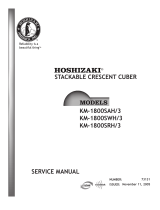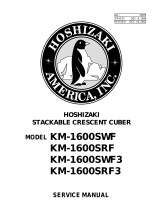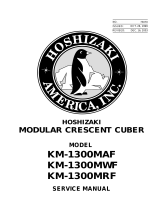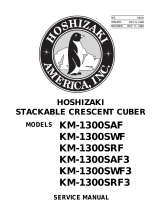
3
CONTENTS PAGE
I. SPECIFICATIONS ..................................................................................................4
1. NAMEPLATE RATING .........................................................................................4
[a] KM-2000SWH3 (Water-cooled) .......................................................................4
[b] KM-2000SRH3 (Remote Air-cooled) ...............................................................5
2. DIMENSIONS/CONNECTIONS ...........................................................................6
[a] KM-2000SWH3................................................................................................6
[b] KM-2000SRH3 ................................................................................................7
II. INSTALLATION AND OPERATING INSTRUCTIONS ...........................................8
1. CHECKS BEFORE INSTALLATION....................................................................8
2. HOW TO REMOVE PANELS ...............................................................................8
3. LOCATION ...........................................................................................................9
4. SET UP ................................................................................................................9
5. INSTALLATION OF THE SECOND UNIT ..........................................................12
6. ELECTRICAL CONNECTION ............................................................................14
7. INSTALLATION OF REMOTE CONDENSER UNIT ..........................................15
[a] CHECKS BEFORE INSTALLATION.............................................................15
[b] LOCATION ....................................................................................................15
[c] SET UP..........................................................................................................16
[d] ELECTRICAL CONNECTION.......................................................................17
[e] STACKING CONDENSER UNIT ..................................................................18
8. WATER SUPPLY AND DRAIN CONNECTIONS ..............................................19
9. FINAL CHECK LIST ...........................................................................................21
10. START UP .........................................................................................................22
11. PREPARING THE ICEMAKER FOR LONG STORAGE....................................23
III. CLEANING AND MAINTENANCE INSTRUCTIONS..........................................25
1. CLEANING INSTRUCTIONS .............................................................................25
[a] CLEANING PROCEDURE ............................................................................25
[b] SANITIZING PROCEDURE...........................................................................27
2. MAINTENANCE INSTRUCTIONS .....................................................................28
• Please review this manual. It should be read carefully before the icemaker is installed
and operated. Only qualified service technicians should install, service and maintain
the icemaker. This manual should be made available to the technician prior to
installation, maintenance or service.
• Keep this manual with the icemaker for later reference.



























